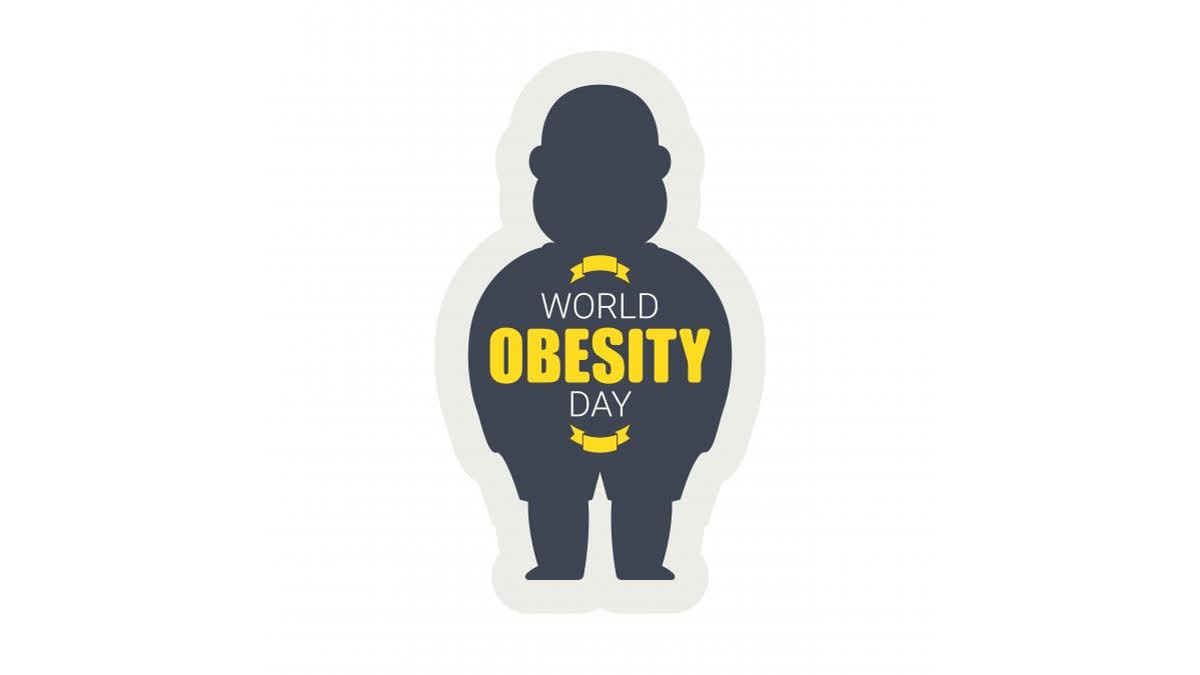Hyderabad: Obesity is a medical condition in which excess body fat gets accumulated to the extent that it could have a negative effect on health. People are generally considered obese when their body mass index (BMI), a measurement obtained by dividing a person's weight by the square of the person's height, is over 30 kg/m2, with the range 25–30 kg/m2 defined as overweight.
Obesity increases the likelihood of various diseases, particularly heart disease, type 2 diabetes, obstructive sleep apnea, certain types of cancer, and osteoarthritis.
History - It is observed on March 4 and is convened by the World Obesity Federation in collaboration with its global members. Hundreds of individuals, organisations and alliances contribute to World Obesity Day, engaging hundreds of thousands of people across the globe. World obesity day encourages practical solutions to help people achieve and maintain a healthy weight, undertake proper treatment, and reverse the obesity crisis.
Theme - This year's campaign theme is 'Let's Talk About Obesity And...'.
Obesity rates among children and adolescents worldwide increased four times from 1990 to 2022, while obesity rates among adults have more than doubled, a new study published in The Lancet has revealed. The total number of children, adolescents and adults worldwide living with obesity has surpassed one billion.
In total, 159 million children and adolescents, and 879 million adults were obese in 2022. The study was conducted by the NCD Risk Factor Collaboration (NCD-RisC), in collaboration with the World Health Organization. Over 1,500 researchers in over 190 countries analysed weight and height measurements of over 220 million people aged five years or older. They reportedly looked at body mass index (BMI) to understand how obesity and underweight have changed worldwide from 1990 to 2022.
Obesity rate in India - A new global analysis, published by The Lancet, found that 12.5 million children (7.3 million boys and 5.2 million girls) in the country, aged between five and 19, were grossly overweight in 2022, up from 0.4 million in 1990. The report showed over three per cent prevalence among children and teens, an increase of over three percentage points from 1990. The report was published on February 29, 2024. Globally, India ranks 182nd for obesity in women and 180th for men in 2022 and ranks 174 for both girls and boys.
There has been a significant rise in female obesity, with women now at 9.8 per cent (up 8.6 percentage points from 1990), while men are at 5.4 per cent (up 4.9 percentage points).
Reasons behind increasing obesity in India
- A change in eating habits is one of the key factors contributing to India’s obesity pandemic. A shift in dietary choices away from traditional foods and physical inactivity
- The diet of children and youngsters in India has become more westernised and more dependent on processed and fast foods due to the country’s expanding economy. These foods frequently include high levels of calories, sugar, and fat, which can cause weight gain and obesity
- Change in lifestyle, lack of sleep, parenting misconceptions, stress, and the change in eating habits increasing consumption of unhealthy foods is one of the main factors contributing to obesity in India, according to Dr A. K. Singh, M.D., D.M (Endo), Consultant Endocrinologist, GD Hospital and Diabetes Institute, Kolkata
Obesity – Causes and Symptoms
Obesity is generally caused by consuming more calories – particularly those in fatty and sugary foods – than you burn off through physical activity. The excess energy is stored by the body as fat
Obesity is an increasingly common problem because for many people modern living involves eating excessive amounts of cheap, high-calorie food and spending a lot of time sitting down, at desks, on sofas or in cars.
There are also some underlying health conditions that can occasionally contribute to weight gain, such as an underactive thyroid gland (hypothyroidism), although these types of conditions don’t usually cause weight problems if they’re effectively controlled with medication.
Obesity can cause a number of further problems, including difficulties with daily activities and serious health conditions.
Day-to-day problems related to obesity include breathlessness, increased sweating, snoring, difficulty doing physical activity, often feeling very tired, joint and back pain, low confidence and self-esteem and feeling isolated.
Health Risks of Overweight & Obesity
Type 2 diabetes: Type 2 diabetes is a disease that occurs when your blood glucose, also called blood sugar, is too high. Nearly 9 in 10 people with type 2 diabetes are overweight or obese.
High blood pressure: High blood pressure also called hypertension, is a condition in which blood flows through your blood vessels with a force greater than normal. Having a large body size may increase blood pressure because your heart needs to pump harder to supply blood to all your cells. Excess fat may also damage your kidneys, which help regulate blood pressure.
Heart disease: Heart disease is a term used to describe several health problems that affect your heart, like a heart attack, heart failure, angina NIH external link, or an abnormal heart rhythm. Being overweight or obese increases your risk of developing conditions that can lead to heart disease, such as high blood pressure, high blood cholesterol and high blood glucose.
Stroke: A stroke happens when a blood vessel in your brain or neck is blocked or bursts, cutting off blood flow to a part of your brain. A stroke can damage brain tissue and make you unable to speak or move parts of your body. Overweight and obesity are known to increase blood pressure — and high blood pressure is the leading cause of strokes
Metabolic syndrome: Metabolic syndrome is a group of conditions that increase your risk for heart disease, diabetes, and stroke. Metabolic syndrome is closely linked to overweight and obesity and a lack of physical activity. Healthy lifestyle changes that help you control your weight may help you prevent and reduce metabolic syndrome.
Fatty liver diseases: Fatty liver diseases develop when fat builds up in your liver, which can lead to severe liver damage, cirrhosis, or even liver failure. These diseases include nonalcoholic fatty liNAFLD and NASH and most often affect people who are overweight or obese.
Some cancers: Being overweight and obese may raise your risk of developing certain types of cancer. Men who are overweight or obese are at a higher risk for developing cancers and prostate. Among overweight or obese women, cancers of the breast and gallbladder are more common.
Treating obesity
- The best way to treat obesity is to eat a healthy, reduced-calorie diet and exercise regularly
- Eat a balanced, calorie-controlled diet as recommended by a weight loss management health professional or a dietitian
- Join a local weight loss group
- Take up activities like fast walking, jogging, swimming or tennis for 150 to 300 minutes a week
- Eat slowly and avoid situations where you know you could be tempted to overeat
- If lifestyle changes alone don’t help you lose weight, a medication called orlistat may be recommended
- In rare cases, weight loss surgery may be recommended


